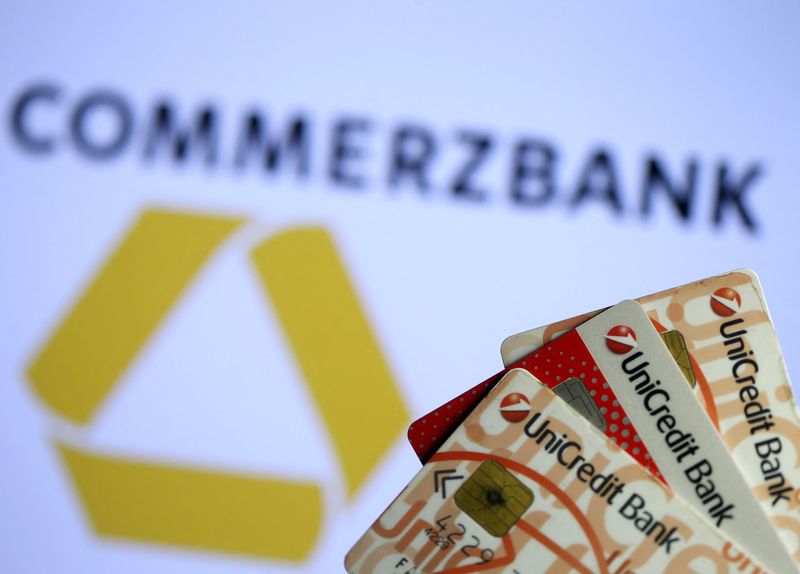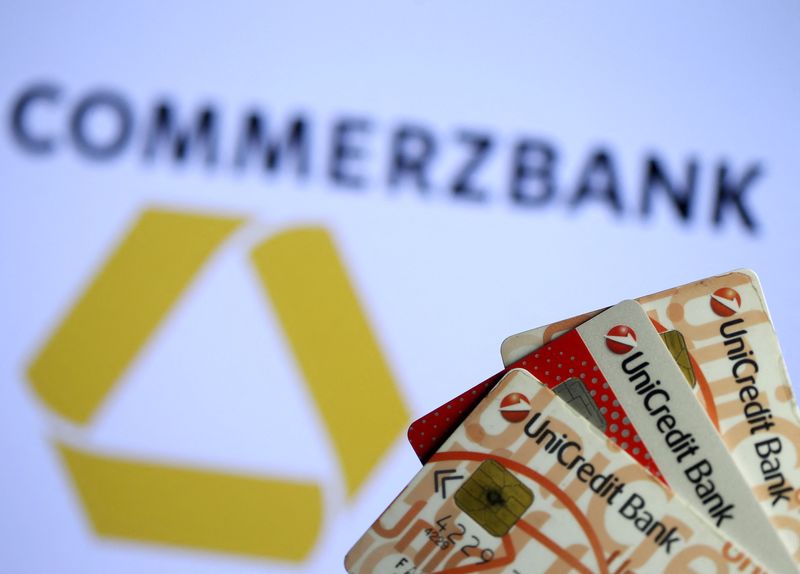
By Christian Kraemer, Tom Sims and John O’Donnell
FRANKFURT/BERLIN (Reuters) – UniCredit’s opening gambit in a takeover play for Commerzbank (ETR:CBKG) has rekindled a debate about the future of German banking, prompting Berlin to pause selling shares in the lender and turning the spotlight on Deutsche Bank as a possible rival suitor.
Italy’s second-largest bank swooped to take a 9% stake in Commerzbank earlier this week, catching German authorities off guard and getting a hostile reception from local management, who want to fend it off.
UniCredit CEO Andrea Orcel said on Thursday he was interested in a merger but that he was in no rush and that his stake in the German bank was, in any event, a good investment.
His blunt approach, picking up a stake in the market before stepping in to buy shares the German government was selling via an overnight placing, has annoyed some officials in Berlin and was unwelcome at Commerzbank’s Frankfurt headquarters, sources told Reuters.
Commerzbank, considered important enough for a state rescue after the 2008 financial crash, is one of Germany’s few major privately-owned banks and a big lender to the country’s so-called Mittelstand of medium-sized companies.
The German government said earlier this month it intended to cut its stake in the bank.
Hans-Peter Burghof, a banking expert with Germany’s University of Hohenheim, said a tie-up with UniCredit would “produce reduced competition in Germany, which is not good for Germany, especially in the segment of medium-sized companies.”
The Finance Ministry declined to comment, and Commerzbank declined to comment on Orcel’s remarks.
As events unfolded, investors also turned their attention to another potential marriage: a takeover by Deutsche Bank.
The combination is “in the best interests of Deutsche Bank and Germany,” analysts at JPMorgan wrote in a note to clients.
“In a world of geopolitical and trade tension, having a larger German bank as a listed national champion and Hausbank (local bank) for German corporates could be an attractive option,” they said.
The JPMorgan analysts said it would also allow Deutsche to cut back its reliance on more volatile investment banking, a long-standing concern for its investors.
Deutsche Bank declined to comment and referred to a statement this week saying it was focused on its growth strategy.
But in Germany, there are doubts about the viability of a Deutsche/Commerzbank union.
Deutsche Bank explored a takeover of Commerzbank five years ago, at the request of the German government, but walked away, people with knowledge of those talks told Reuters at the time.
One major hurdle was what one German official told Reuters at the time would be a multi-billion-euro financial hole because any merger could trigger an adjustment to the valuation of some investments, such as Italian government bonds that Commerzbank holds. A tie-up could have crystallised a loss.
Potential job cuts and the impact on customers are also big concerns.
Trade union chief Stephan Szukalski, who is also a non-executive director on Deutsche Bank’s supervisory board, said he would be very surprised if Deutsche were to take up talks with Commerzbank.
Szukalski, speaking in his capacity as a union boss, said he predicted that such a combination would lose corporate clients who wanted a choice of banks.
“It wouldn’t pay off,” he said. “Of course we’d be against it. 100%….it would simply be the false move. Banks need to complement each other when there’s a takeover.”
In the meantime, Orcel said he’s going to seek approval from the banks’ chief regulator, the European Central Bank, for UniCredit to increase its stake should it wish to.
“Cross-border mergers have been hoped for by many authorities, and it will be very interesting to see that process unfold in the weeks to come,” ECB President Christine Lagarde told reporters on Thursday.

